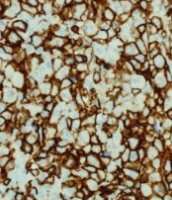Gene clue to how virus causes cancer

Virologists and immunologists at Imperial College London and University of Zurich have identified mutations in Epstein-Barr virus (EBV) that increase the capacity of the virus to cause cancer, in a study published this week in the Journal of Clinical Investigation. The research reveals that EBV carries a tumor suppressor gene – the first such gene known in a cancer-causing virus.
EBV is one of the most common viruses in humans, persistently infecting more than 90 per cent of the population. The virus can remain in the body for many years without any obvious symptoms, but it also causes glandular fever and is associated with several types of cancer, including lymphoma.
The new research has found that EBV normally carries a gene that suppresses cancer, at least in part by alerting the host immune system to the infected cells. Mutations that inactivate this gene allow the virus to escape detection by the immune system and cause cancer.
The researchers studied the effect of mutations in the EBNA3B gene in mice engineered to carry components of the human immune system. When these mice were infected with normal EBV, the reconstituted immune system was able to control the growth of the infected cells. When they were infected with EBV with EBNA3B deleted, they developed aggressive lymphomas – tumors formed from immune cells called B lymphocytes.
B cells infected with the normal EBV virus secreted a protein called CXCL10 that attracts T cells, another type of lymphocyte. T cells travel to sites of infection and inflammation and some can eliminate abnormal cells. If the virus lacked EBNA3B however, the B cells failed to produce CXCL10, which could explain why they were able to evade the immune system and develop into tumors.
The researchers also sequenced DNA from samples of human lymphomas linked to EBV, and identified mutations in EBNA3B in three different types of EBV-positive lymphoma.
“This is the first known example of a cancer-causing virus carrying a tumour suppressor gene,” said Professor Martin Allday, from the Department of Medicine at Imperial College London, who led the study with Professor Christian Münz at the University of Zurich. “We can speculate that this gene might help ensure the long-term survival of the host without serious disease, which allows the virus to persist in human populations.
"The findings have highlighted the importance of factors like CXCL10 that attract immune cells in the surveillance of tumors. Understanding how these factors are regulated and work in tumours may assist in the development of better strategies for manipulating the immune system in cancer therapies.”
The research at Imperial was funded by the Wellcome Trust, with additional support from Leukemia & Lymphoma Research and the UK Children’s Cancer and Leukaemia Group. The research at the University of Zurich was mainly supported by Cancer Research Switzerland with additional contributions by the National Cancer Institute, the Sassella Foundation, the Association for International Cancer Research, the Vontobel Foundation, Novartis, and the Swiss National Science Foundation.
More information: RE White et al. 'EBNA3B-deficient EBV promotes B cell lymphomagenesis in humanized mice and is found in human tumors.' Journal of Clinical Investigation, 12 March 2012. doi:10.1172/JCI58092














